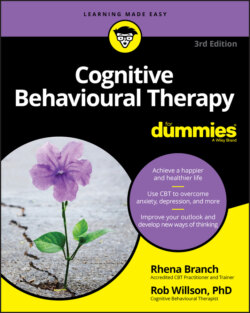Читать книгу Cognitive Behavioural Therapy For Dummies - Rob Willson - Страница 52
Ensuring Successful Behavioural Experiments
ОглавлениеTo get the highest level of benefit when designing and carrying out behavioural experiments, keep the following in mind:
Ensure that the type of experiment you choose is appropriate. Make your experiments challenging enough for you to gain a sense of accomplishment from conducting them. Equally, take care to devise experiments that won’t overwhelm you.
Have a clear plan about how, when and where (and with whom, if relevant) you plan to carry out your experiment.
Be clear and specific about what you want to find out from your experiment – ‘to see what happens’ is too vague.
Decide in advance how you’ll know whether your prediction comes true. For example, what are the clues that someone’s thinking critically of you?
Plan what you’ll do if your prediction comes true. For example, how do you respond assertively if someone is actually critical of you?
Use the behavioural experiments record sheet in the following section to plan and record your experiment.
Consider what obstacles may interrupt your experiment and how you can overcome them.
When evaluating the outcome of your experiment, check that you’re not being biased (for example, discounting the positive or mind-reading, thinking errors we describe in Chapter 2) in the way you process your results.
Consider whether you rely on any (including subtle) safety behaviours. Safety behaviours can affect the results of your experiment or determine how confident you feel about the outcome – for example, thinking that you avoided collapsing by concentrating hard rather than discovering conclusively that your feelings of dizziness are a result of anxiety, not imminent fainting.
Plan ways to consolidate what you discover from your experiment. For example, should you repeat the experiment, devise a new experiment, change your daily activities or some other action?
Treating your negative and unhelpful thoughts with scepticism is a key to reducing their emotional impact. Experiments can help you to realise that many of your negative thoughts and predictions are not accurate in reality. Therefore, we suggest you take many of your negative thoughts with a pinch or more of salt.
Think about therapy as an experiment rather than a lifelong commitment, especially at the beginning. By thinking in this manner, you can feel less under pressure and more able to approach therapy with an open mind.
